Stephen Gowans
If you don’t want people to lash out at you violently, don’t provoke them. If you want to prevent terrorist attacks, don’t make new enemies. Sound advice. But hardly macho. And the Bush administration’s approach to fighting terrorism is decidedly macho. You won’t find Bush’s team addressing the grievances of the victims of US foreign policy—the bombing victims, the injured, the disabled, the bereft, the dispossessed, the refugees. You won’t find its members laying awake at night worrying that some Afghans and Iraqis are so incensed at what the US has done to them, their neighbours, their friends, and their family that they’ve sworn never to rest until they exact revenge.
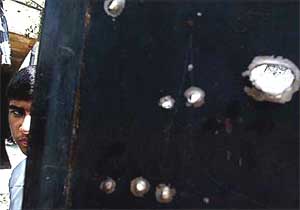
Instead, Bush, Cheney, Rumsfeld, Powell and Rice go along their way, unconcernedly ordering the bombing of Afghanistan, building concentration camps at Guantanamo Bay, ordering the assassination of terrorist suspects, invading Iraq, threatening war on Iran and North Korea—none of which address the reasons why there’s enormous resentment of the United States abroad, and all of which do plenty to pile new layers of resentment on old, ensuring terrorism becomes more likely, not less.
But Bush’s supporters say talk of addressing grievances, and not making new enemies, is nice, in a kind of ivory towerish sort of way—but that’s not how it works in the real world. Terrorists only understand force. They must be hunted down and crushed. “Terrorist attacks are not caused by the use of strength,” the president says. “They are invited by the perception of weakness.” And addressing grievances is unmistakably a sign of weakness.
Liberals and progressives and the antiwar right say the Bush administration is misguided. If only Bush and company could see that violence begets violence, war and bombing beget terrorism—and that war itself is terrorism. But what if the Bush administration wasn’t half as macho as its supporters think, and not as dumb and misguided as its detractors believe? What if the people who shape policy in Washington recognized that if you really want to prevent terrorist attacks, you don’t hand people reasons to plant bombs, undertake suicide missions, or fly planes into office towers?
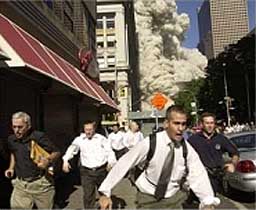
I’d say the Bush cabinet recognizes its martial foreign policy is inflaming terrorism, not dampening it, but is using its “war on terrorism” as a cover for the vigorous pursuit of a long-standing US foreign policy goal—the expansion of US influence abroad, driven, ultimately, by the need of constantly expanding markets for US goods and investment (or more immediately, by the need to eclipse the rise of potential regional hegemons like Russia and China, which rival US firms for access to Asian markets, labour and resources.)
There are two reasons to believe this: One, US foreign policy has always, at its heart, been economically expansionist. Two, the Bush cabinet recognizes that Israel’s handling of the Palestinians—which parallels Washington’s fight against al-Qaeda and Iraq—isn’t dampening terrorism; it’s making it harder, more determined and more destructive.
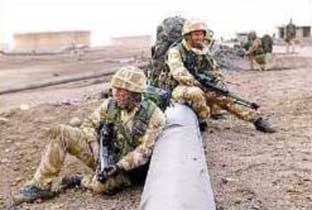
The three most important aspects of US foreign policy are markets, markets and markets. Given that the principal activity of the country is profit-making and that its policy making centre is dominated by banks and corporations, it would be odd were it otherwise. Accordingly, George W. Bush’s September 20, 2002 National Security Strategy—nominally about safeguarding the physical safety of Americans—teems with references to free markets, open markets, free trade and free enterprise (as in, we will “actively work to bring...free markets and free trade to every corner of the world.") But then Bush is simply standing on the shoulders of presidents before him, looking after the people presidents always look after: those who own and control the economy, and who, by virtue of their influence, own and control Washington, as well.
Howard Taft explained that US foreign policy “may well be made to include active intervention to secure for our merchandise and our capitalists opportunity for profitable investment.” Woodrow Wilson said, “Since trade ignores national boundaries and the manufacturer insists on having the world as a market, the flag of his nation must follow him, and the doors of the nations which are closed against him must be battered down. Concessions obtained by financiers must be safeguarded by ministers of state, even if the sovereignty of unwilling nations be outraged in the process.”
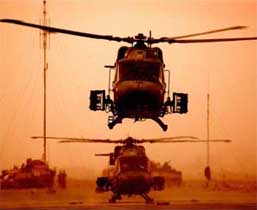
It is a matter of no minor significance that the three countries that make up the axis of evil—pre-war Iraq, Iran and North Korea—are all, or were, closed in some way to US investment and goods on preferential terms. Dwight Eisenhower explained, “A serious and explicit purpose of our foreign policy [is] the encouragement of a hospitable climate for [private] investment in foreign nations.” And assorted defence secretaries and secretaries of state have talked about the Pentagon as enforcing access for US capital to markets abroad and of safeguarding the investments of US corporations and banks in potentially unstable parts of the world.
Significantly, Marx and Engels, in their Communist Manifesto talked of “the need of a constantly expanding market” which chases capital “over the whole surface of the globe” encouraging it to “nestle everywhere, settle everywhere, establish connections everywhere”—an enduring description of the imperative that underlies US foreign policy, as well as that of other capitalist countries.
The Bush administration may seem clueless when it comes to the consequences of its own foreign policy, but it shows itself to be acutely aware of the consequence of the fundamentally similar policy of Israel as regards the Palestinians. US Secretary of State Colin Powell says, “We are always saying to our Israeli colleagues, You have to consider the long-term consequences...and are you creating more Hamas killers in the future by actions such as this which injure innocent people? To kill one Hamas leader, but wound 9 children or 10 children in the course of this, who will grow up to become Hamas leaders or Hamas killers later—they have to consider the long-term consequences of this policy.”
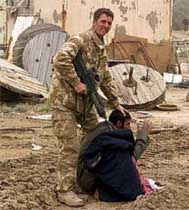
The parallels with Washington’s own actions are obvious—and unlikely to be lost on Powell and his colleagues. You have to consider the long-term consequences—and are you creating more al-Qaeda killers in the future by actions such as the bombing of Afghanistan and the bombing of Iraq which injure innocent people, far more than the Israelis have ever injured?
Washington’s war on terrorism has two outcomes: More terrorism in the future, as the bombed, dispossessed and hardened, strike back. More influence over West and Central Asia, and wider access for US capital to the regions’ markets, natural resources and labour. The former is accepted as a necessary evil, even desirable. The more terrorism there is, the more Washington can expand its quest for wider control, citing the need to deal with a growing terrorist menace.
While it may be cathartic to ridicule members of the Bush cabinet as boneheads, it would be a mistake to assume those who shape policy in Washington are misguided and unaware of what they’re doing. On the contrary, they know exactly what they’re doing. Preventive war and regime change have put Washington in the position of being able to embark on the project of making over Iraq and Afghanistan into models of “free markets and free trade,” which is to say markets, labour and natural resources once formerly closed to US capital, are being open on favourable terms.
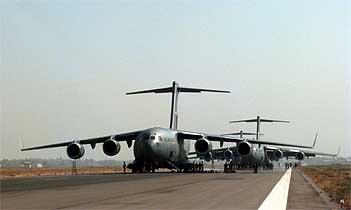
More terrorism means the effort to fight terrorism must be redoubled, and fought on new fronts. An Iranian front and a North Korean front await. Iran and North Korea will also be made over into models of “free markets and free trade.” US military bases now dot former Soviet republics, hemming in Russia and China, two strategic competitors which rival US capital for access to Asian markets, resources and labour. New US military bases may, in the not too distant future, be established in North Korea, bringing the US military right up to the border of China.
For US banks and corporations the war on terror isn’t a war that promises less terrorism, but a war that promises new business opportunities and fatter profits. It could hardly be said that the Bush administration—tightly connected to US financial and business circles—doesn’t know what it’s doing. It knows all to well what’s it’s doing. And it’s succeeding.